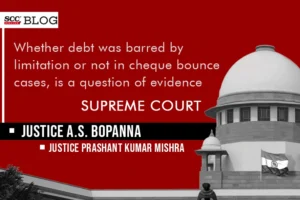Supreme Court: In a criminal appeal assailing the Andhra Pradesh High Court’s judgment, whereby criminal proceedings against the accused for offences under Section 138 and 142 of the Negotiable Instruments Act (‘NI Act’) were quashed, the Division Bench of A.S. Bopanna* and Prashant Kumar Mishra, JJ. allowed the appeal and set aside the impugned order.
Factual Matrix
The accused borrowed Rs. 20,00,000/- from the appellant and executed a promissory note on 25-07-2012 stating that the amount was to be repaid in full and along with interest at 2 percent per month and that full and final payment will be made by December, 2016. The accused issued a cheque of Rs. 10,00,000/- on 28-04-2017. However, the cheque was returned due to insufficient balance in the account to honour the cheque, hence, a legal notice was issued to the accused. Subsequently, a complaint was registered against the accused under Section 138 of the NI Act. The accused filed a petition before the High Court under Section 482 of the Criminal Procedure Code, 1973, (‘CrPC’) seeking quashment of the criminal proceedings against him and the High Court allowed the petition vide impugned judgment and observed that the limitation for enforcing the promissory notes had expired much prior to the issuance of the cheques in question.
Decision
The Court referred to A.V. Murthy v. B.S. Nagabasavanna, (2002) 2 SCC 642 and S. Natarajan v. Sama Dharman, (2021) 6 SCC 413, and said that it is clear from the nature of the proceedings arising under the NI Act and also that the cheque itself is a promise to pay even if the debt is barred by time, the Courts keep in view the provision contained in Section 25(3) of the Contract Act, 1872 and if the question as to whether the debt or liability being barred by limitation was in issue, the same has to be decided based on the evidence to be adduced by the parties since the question of limitation is a mixed question of law and fact. The Court also said that a criminal action is initiated only in cases where an amount which is out and out non-recoverable, towards which a cheque was issued, dishonoured. Further, the Court added that then the Courts exercising jurisdiction under Section 482 of the CrPC are justified in interfering, otherwise not.
Regarding the impugned judgment, the Court noted that the High Court reached its conclusion, that the date of issuance of the cheque was beyond three years from the date of issuance of the promissory note so as to classify it as a time-barred debt, on the basis of two facts, noted by the High Court (i) that the promissory notes were of the year 2012, (ii) that the cheques were issued in the year 2017. The Court said that the High Court had misdirected itself and had therefore erred in its conclusion.
The Court noted that in the present case, the promise was to repay the principal amount with the interest accrued by December, 2016. Hence, the Court said that the cause of action to initiate proceedings to recover the said amount if not paid by December 2016 would arise only in the month of December, 2016. The Court also perused Article 34 to the Schedule of the Limitation Act, 1963, which provides three years from the date of expiry as a period of limitation for a promissory note. Thus, the Court said that the period of limitation would begin to run from the month of December, 2016 and it would expire at the end of three years thereto i.e., during December, 2019. Therefore, the Court held that the cheque issued for Rs.10,00,000/- which was the subject matter herein was dated 28-04-2017 which was well within the period of limitation.
Therefore, the Court held that the complaint was filed well within the time and there was no occasion whatsoever in the instant case to exercise the power under Section 482 of the CrPC to quash the complaint. Hence, the Court set aside the impugned High Court’s order.
[K. Hymavathi v. State of A.P., 2023 SCC OnLine SC 1128, Decided on 06-09-2023]
Judgment Authored by: Justice A.S. Bopanna
Know Thy Judge | Supreme Court of India: Justice A.S. Bopanna
*Deeksha Dabas, Editorial Assistant has reported this brief.


